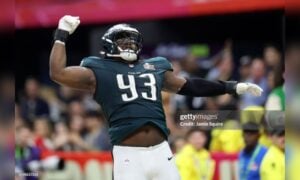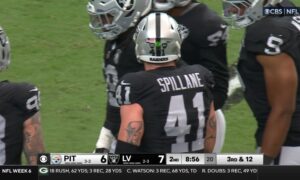By Jeremy Hritz
Recently on nfl.com, former Ravens coach Brian Billick posted a breakdown of the 12 NFL playoff participants and their rankings in what he feels are the most significant categories related to winning (here is the link: ). Those categories are as follows:
- Rushing offense
- Passing defense
- Rushing defense
- Passing defense
- Turnover differential
- Explosive play differential
- 3rd down offense
- 3rd down defense
- Red zone offense
- Red zone defense
Billick totaled teams rankings in these categories and employed golf wisdom to anoint the teams with the lowest scores as those most likely to advance in the playoffs. The 12 teams were ranked as follows:
- Baltimore
- Houston
- New Orleans
- Pittsburgh
- Atlanta
- Detroit
- San Francisco
- Green Bay
- New England
- New York
- Cincinnati
- Denver
If, Billick’s stat proves to be prophetic, then Baltimore will meet New Orleans in the Super Bowl. What is interesting about Billick’s stat is that outside of New Orleans, Atlanta, and Detroit, the four other teams in the top seven are ranked in the top five in overall defense (points allowed). From another perspective, it is evident that there is a distinction between the AFC, being defensively dominated, while the NFC is stronger offensively. Four of the six AFC playoff teams rank in the top ten of NFL defenses (points allowed), while in the NFC, five of the six teams playoff teams are ranked in the top ten in offense (points scored). Ultimately, this year’s Super Bowl will most likely be a showdown between a defensive and an offensive powerhouse. This raises the question, which has been more successful in the NFL this year? A stronger defense or offense? While the common belief in the NFL has always been “defense wins championships,” can they win championships against colossal offensive juggernauts such as Green Bay, New Orleans, or Detroit? So who triumphed in the regular season when Green Bay, New Orleans, and Detroit faced off against a top 12 defensive team (points allowed)? Take a look at the table below.
|
W/L |
Points For/Points Against |
|
| Green Bay – Ranked # 1 in points scored |
L- KC (ranked 12th), 14-19 Record: 0-1 |
14-19 |
| New Orleans – Ranked # 2 in points scored |
W – Houston (ranked 4th), 40-33 W – Jacksonville (ranked 11th), 23-10 W – Tennessee (ranked 8th), 22-17 Record: 3-0 |
85-60 |
| Detroit – Ranked # 4 in points scored |
W – Kansas City (ranked 12th), 48-3 L – San Francisco (ranked 2nd), 19-25 Record: 1-1 |
67-28 |
Overall Record: NFC Offensive Powerhouse vs. Top 12 Scoring Defense – 4 wins, 2 losses
Conversely, how did the top AFC defensive teams (scoring) fare against top 12 offenses (points scored)? The table below illustrates:
|
W/L |
Points Scored/Points Against |
|
| Pittsburgh – Ranked # 1 in points allowed |
L – Baltimore (ranked 12th), 7-35 L- Houston (ranked 10th), 10-17 W – New England (ranked 3rd), 25-17 L – Baltimore ranked 12th), 20-23 L – San Francisco (ranked 11th), 3-20 Record: 1-4 |
65-112 |
| Baltimore – Ranked # 3 in points allowed |
W – Houston (ranked 10th), 29-14 W – San Francisco (ranked 11th), 16-6 L – San Diego (ranked 5th), 14-34 Record: 2-1 |
59-54 |
| Houston – Ranked # 4 in points allowed |
L – New Orleans (ranked 2nd), 33-40 L – Baltimore (ranked 12th), 14-29 W – Atlanta (7th), 17-10 L – Carolina (ranked 5th), 13-28 Record: 1-3 |
77-107 |
Overall Record: AFC Defensive Powerhouses vs. Top 12 Scoring Offense – 4 wins, 8 losses
As these charts show, the NFC was 4 and 2 against top 12 defensive teams based on points allowed, with an average score in those contests of 27-17. Conversely, the AFC was 4 and 8 against top 12 offensive teams based on points scored, with an average score of 17-23. Does this stat mean that the NFC is the clear cut favorite to win the Super Bowl? Maybe. What this information may do is reinforce Billick’s stat because both the Baltimore and New Orleans have the best records against the top scoring offensive and defensive teams. However, what these statistics cannot account for are bad losses by Baltimore to Jacksonville and average teams in Seattle and Tennessee, and by New Orleans to the worst offense in the NFL in St. Louis and the worst defense in the NFL in Tampa Bay. It is also worth noting the fact that outside of New Orleans, Green Bay or Detroit did not play against a top five scoring defense, leaving more than a few questions to be answered. Regardless, the Super Bowl will be a battle between defensive and offensive studs, and it will be interesting to see if defense really will a championship come February.







